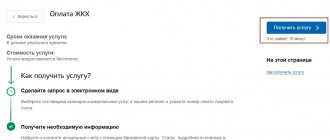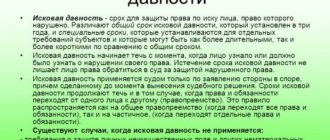Supreme Court of the Russian Federation on the limitation period
Colleagues, the article is really good, there are references to international law, which made me very happy, however, an incident happened in my life: the Plaintiff filed a statement of claim in court against my client (Defendant). The court accepted the claim and considered it in a simplified manner, because The defendant changed his place of residence and, on top of everything, was on a business trip. Upon returning from a business trip, he sought legal help. The essence of the claims came from the loan agreement. My client (Defendant) borrowed a certain amount of money, paid the money back on time, and received a receipt from the Plaintiff. The receipt was drawn up on December 23, 2014. The deadline for refunding funds was December 31, 2014. December 21, 2021 The Plaintiff sent a statement of claim to the court through the Russian Post Office. The court accepted the application and considered it in March 2021. made a default judgment to recover funds from the Defendant in full. In April 2021 We applied for cancellation of the default judgment, the decision was canceled. And then we noticed that the statement of claim was initially signed not by the plaintiff himself, but by an unidentified person. The application was not accompanied by a power of attorney for the representative; the name of the Plaintiff is written, but the signature is not his. The limitation period ended on December 31, 2021. and from January 1, 2018 should have been missed. The court of first instance left without consideration the Plaintiff's statement of claim, signed by an unidentified person (Part 4 of Article 222 of the Code of Civil Procedure of the Russian Federation). The next day (May 23, 2021), another representative of the Plaintiff submits a statement of claim to the court in the proper form, attaching a power of attorney and the name of the representative. The defendant makes a statement about missing the limitation period, because The plaintiff missed the deadline by 4 months and 23 days. However, the court excludes from the statute of limitations the period during which the statement of claim was in court from the moment of filing - December 21, 2021. until May 22, 2021 and denies the Defendant the application of Art. 196 of the Civil Code of the Russian Federation. The interests of the Plaintiff were represented in court by a lawyer during the initial and re-examination of the claim. he had a lawyer's warrant and a lawyer's certificate. My question is quite simple. Could improper behavior of the Plaintiff's representative, expressed in filing and signing a statement of claim for the Plaintiff himself (in fact, an abuse of authority), be a circumstance of interruption of the limitation period or a circumstance of interruption of the limitation period? If so, then how can such behavior of the Plaintiff (not empowering his representative), violating the law, entail any legal consequences in the form of suspension of the statute of limitations? In itself, suspension, interruption, or interruption of the limitation period is a tool for the Plaintiff to preserve the possibility of filing a claim in court in the future, without fear that his claim will be rejected on the basis of missing the limitation period. However, what to do with the situation when the Plaintiff (the Plaintiff’s representative or a generally unknown person) intentionally filed a statement of claim with the goal of “what if it goes wrong” and any legal consequences occur in the form of collection of funds, interruption of the statute of limitations, etc. d. When answering the question why we didn’t refer to the receipt, that’s what the Client wanted. He believes that in this case there is a limitation period and we do not have to prove any other circumstances.
General and special limitation periods (SLD)
According to paragraph 1 of Art. 196 of the Civil Code, the plaintiff prepares and files a claim in court within 3 years (Article 200 of the Civil Code) after:
- obtaining information about a violation of one’s rights and the identity of the defendant;
- expiration of the time for execution of the contract, if it has been established.
3 years is the general statute of limitations for a statement of claim in a civil case; it cannot be changed by agreement or agreement of the parties (Article 198 of the Civil Code). But it also has limitations: it is impossible to file a lawsuit later than 10 years from the date of violation of the right, regardless of the moment when the SIA began (clause 2 of Article 196 of the Civil Code).
In addition to the general ones, there are also special limitation periods for certain types of offenses, for example:
- for labor disputes - 3 months, for disputes about dismissal - 1 month (Article 392 of the Labor Code);
- for cases of violation of the right of first refusal - 3 months (Article 250 of the Civil Code);
- to recognize the invalidity of a contested transaction - 1 year (clause 2 of Article 181 of the Civil Code);
- for claims against contractors for inadequate quality of work - 1 year (Article 725 of the Civil Code).
IMPORTANT!
The expiration of the SIA does not deprive the plaintiff of the right to judicial protection. The court is obliged to accept the claim for consideration regardless of the elapsed time. The court has the right to apply the consequences of an omission and refuse the applicant’s claim only on the initiative of the defendant citing delay (clauses 1, 2 of Article 199 of the Civil Code).
Analytics Publications
The possibility of judicial protection will be jeopardized if in court the faulty debtor suddenly refuses promises to pay the debt and declares the application of limitation. Especially to protect the interests of the plaintiff in such cases, the legislator provided for the institution of a break in the limitation period (Article 203 of the Civil Code of the Russian Federation). However, the mechanism is poorly regulated: the law does not contain examples or criteria of behavior that would confirm the recognition of debt. Practice shows that for this reason it is often difficult for a creditor to determine which actions of the obligated person actually interrupt the statute of limitations and which only create an illusion.
Due to insufficient detail of the rules on interrupting the limitation period, a bona fide debtor may also suffer. Even if the obligated person did not plan to acknowledge the debt, his reckless behavior in relations with the creditor can easily be misinterpreted by the court and lead to an unjustified interruption of the statute of limitations. This will actually open the way for those claims that the creditor did not take care of in time.
Only active actions of the debtor indicate recognition of the debt
The list of actions confirming the recognition of a debt was formulated by the Plenum of the Supreme Court of the Russian Federation in paragraph 20 of Resolution No. 43 dated September 29, 2015 “On some issues related to the application of the provisions of the Civil Code of the Russian Federation on the limitation period” (hereinafter referred to as Resolution of the Plenum of the Supreme Court of the Russian Federation No. 43).
These actions include:
— recognition of the claim;
- a change in the contract by an authorized person, from which it follows that the debtor acknowledges the existence of a debt, as well as the debtor’s request for such a change in the contract (for example, a deferment or installment plan);
— act of reconciliation of mutual settlements, signed by an authorized person.
Of course, the above list is approximate and does not exhaust the variety of actions that may indicate recognition of a debt in practice, for example:
The fact of issuing a receipt or letter of guarantee
, in which the debtor undertook to repay the debt, as evidence that the debt was recognized (decision of the Supreme Court of the Russian Federation dated 04/07/2015 No. 18-KG15-3, resolution of the Federal Antimonopoly Service of the Ural District dated 01/21/2014 in case No. A76-189/2013).
Novation of a debt into a loan obligation, or offset of counter similar claims
(decrees of the Presidium of the Supreme Arbitration Court of the Russian Federation dated July 14, 2009 No. 5286/09, the Arbitration Court of the Ural District dated August 14, 2014 in case No. A60-39962/2013).
As a rule, such incidents are possible if the relevant agreements are invalid, that is, when the initial obligation of the debtor is not considered terminated (Article 167 of the Civil Code of the Russian Federation). The court states the legal consequences not of the transactions themselves, but of the fact of their conclusion. From this fact, in the absence of defects of will and subjective composition, it undoubtedly follows that the debtor recognized the original obligation.
Attempts by the debtor to agree on a debt repayment schedule with the creditor, correspondence between the parties about their intention to conclude a settlement agreement, or even a draft of an individual legal act
(decrees of the Arbitration Court of the North-Western District dated December 3, 2014 in case No. A66-10301/2013, FAS Volga District dated August 21, 2007 in case No. A12-800/06-C32, dated October 22, 2007 in case No. A40-2162/05 -43-25).
However, it is easy to see that in any situation we are talking exclusively about the active behavior of the debtor. The fact is that in the context of the Civil Code, only the actions of the obligated person can indicate recognition of the debt
Quote: “The limitation period is interrupted by the obligor’s performance of actions indicating recognition of the debt” (Article 203 of the Civil Code of the Russian Federation).
The law enforcer has repeatedly noted that a broad interpretation of this norm is unacceptable: the silence (inaction) of the debtor does not interrupt the statute of limitations under any circumstances. Therefore, the fact that the debtor did not challenge the payment document on the direct debit of funds does not prove recognition of the debt (clause 23 of Resolution of the Plenum of the RF Armed Forces No. 43). Or, for example, for similar reasons, the statute of limitations is not interrupted on the sole grounds that the debtor did not respond to the creditor’s claim or did not respond to the statement of reconciliation of accounts received from the creditor (resolution of the Arbitration Court of the Ural District dated May 31, 2017 in case No. A60-29845/2016 , 9 AAS dated 04/14/2017 in case No. A40-125750/16).
At the same time, the active behavior of the debtor does not always indicate recognition of the debt. In each specific case, taking into account certain criteria, the court will have to find out whether the debtor’s behavior gave rise to a reasonable assumption of recognition of the debt, and whether the creditor reasonably refrained from enforcing the protection of the right.
You can refer to the fact of debt recognition if the following criteria are met:
In order not to miss the limitation period due to a false assumption of a break, you need to understand what key conditions the debtor’s behavior meets, confirming the recognition of the debt within the meaning of Art. 203 of the Civil Code of the Russian Federation. Taking into account the adversarial principle, it is the plaintiff who must prove that there has been a break in the limitation period (clause 12 of the Resolution of the Plenum of the RF Armed Forces No. 43). However, the information will also be useful for a debtor who wants to minimize the risks of a legal dispute drawn out over a long period. Since the question is rather of an applied nature, let us consider the requirements for the debtor’s behavior through the prism of judicial practice.
1. Actions to recognize the debt come from an authorized person.
The actions of the debtor's representative, indicating the recognition of the debt, interrupt the limitation period only if this person had the appropriate powers (clause 22 of the Resolution of the Plenum of the RF Armed Forces No. 43). The rule is universal and applies regardless of specific types of confirmatory actions. With this
In its explanations, the Plenum of the RF Armed Forces makes reference to the rule on representation (Article 182 of the Civil Code of the Russian Federation), due to which the authority may also be evident from the situation in which the representative acts.
The signing of a reconciliation report by the chief accountant is perhaps the most common case when, in refutation of arguments about interrupting the statute of limitations, the defendant points out the lack of authority of the representative who confirmed the recognition of the debt. The problem is that judicial practice on issues of the legal force of such reconciliation acts does not differ in uniformity of approaches.
Most courts take the position that, by virtue of Art. Art. 53 and 182 of the Civil Code of the Russian Federation, the chief accountant of the debtor organization does not have the right to resolve legally significant issues such as confirming the fact of debt recognition without an appropriate power of attorney.
Thus, in the opinion of some courts, the presence of the organization’s seal on reconciliation acts does not indicate recognition of the debt by the obligated person (resolution of the Far Eastern District Administrative Court dated March 9, 2016 in case No. A37-998/2015, West Siberian District Arbitration Court dated March 23, 2017 in the case No. A81-5919/2015, AS of the North Caucasus District dated 04/11/2017 in case No. A22-2728/2016).
At the same time, other courts believe that the stamp on the reconciliation report means that the employee’s powers are clear from the situation (decrees of the Court of Justice of the West Siberian District dated 08/15/2016 in case No. A27-13820/2015, Court of the North-Western District dated 12/22. 2016 in case No. A56-84165/2015, AS of the Far Eastern District dated 02/08/2017 in case No. A51-4411/2016).
In such a situation, the safest option for the lender is to request statements of reconciliation of payments signed by the head of the organization. In addition, if the head of the organization approves the act of reconciliation of accounts signed by the employee, such an act can also be used as evidence of recognition of the debt (clause 1 of the Review of judicial practice of consideration of cases related to the application of the provisions of the Civil Code of the Russian Federation on the limitation period, approved by the resolution of the Presidium of the North-Eastern Arbitration Court). Caucasian District dated December 11, 2015, resolution of the Arbitration Court of the Ural District dated April 20, 2017 in case No. A34-6545/2016).
2. The will of the debtor is clearly expressed.
The limitation period is interrupted only by such behavior, from which the recognition of the fact of debt clearly follows. For example, a response to a claim that does not contain an indication of recognition of the debt does not in itself indicate recognition of the debt (clause 12 of Resolution of the Plenum of the RF Armed Forces No. 43). Moreover, the courts often side with the debtor and apply a statute of limitations if the evidence of recognition of the debt is ambiguous.
Thus, the court considered the case on the seller’s claim to collect debt for the delivered goods and came to the conclusion that the reconciliation act does not confirm the recognition of the debt by the buyer. It followed from the act that the plaintiff delivered goods to the defendant for a certain amount, but received only part of this amount as payment for the goods. This document also reflected information about other transactions of the parties, and it turned out that in the final line of the act the parties established the existence of a debt not with the defendant, but with the plaintiff. In such a situation, the court indicated that formally the reconciliation act does not contain phrases and expressions that the defendant acknowledges the debt; it does not follow from the act that the parties recorded his debt (resolution of the Federal Antimonopoly Service of the Volga-Vyatka District dated June 28, 2011 in case No. A31-6102 /2010).
3. The actions of the debtor relate to a specific obligation.
The creditor may refer to the recognition of debt if the actions of the debtor confirm not only the recognition of the fact of the debt, but also relate to the specific obligation from which the recognized debt arises. To do this, information must be recorded such as the amount, basis and period of indebtedness for a specific obligation (resolution of the Moscow District Court dated September 28, 2016 in case No. A40-184790/2015, FAS East Siberian District dated June 25, 2014 in case No. A58 -5226/2013).
However, sometimes the debtor’s behavior indicates recognition of a specific debt even without strict detail. Thus, if the debt reconciliation act reflects the defendant’s total debt under various legal relations and the disputed obligations are not specified, but there are no other obligations between the parties, the court recognizes such an act as a basis for interrupting the limitation period (resolution of the Administrative Court of the North Caucasus District dated October 27, 2016 in case No. A32-35328/2015).
4. Recognition of the debt is confirmed specifically in relation to the creditor.
Actions confirming the recognition of debt must be addressed to the creditor. And although the literal wording of Art. 203 of the Civil Code of the Russian Federation does not limit the circle of addressees in this way; the approach is still common in judicial practice. As a rule, courts do not accept the actions of the debtor in relation to third parties as evidence of recognition of a debt.
We believe that the position of the courts is based on an assessment of the purpose of the expression of will of the obligated person. The limitation period is only interrupted if the purpose is to inform the creditor directly of the acknowledgment of the debt. If the latter finds out about the relevant circumstances against or against the will of the obligated person, the consequences in the form of a break should not occur.
Court case card
For example, in one court case, the landlord demanded to recover rental payments from a once bankrupt tenant. The lawsuit was filed nearly two years after the tenant's bankruptcy case ended with the approval of a settlement. The plaintiff objected to the arguments about the statute of limitations, based on a document from the bankruptcy case - a conclusion on the possibility of restoring the debtor's solvency. The bankruptcy trustee provided this conclusion to the bankruptcy case on the eve of consideration of the petition for approval of the settlement agreement. The document contained information about all the debts of the defendant, including to the plaintiff. Therefore, the plaintiff assumed that the limitation period was interrupted by an action indicating recognition of the debt. Despite the fact that the plaintiff participated in the bankruptcy case as one of the creditors, the court rejected such evidence. He motivated his decision by the fact that the conclusion was not addressed to the plaintiff, it was not prepared to recognize the debt directly to him (decision of the Perm Territory Court of Justice dated October 2, 2015 in case No. A50-12978/2015; higher courts upheld this decision, but paraphrased the reasons court of first instance).
As an example, we will also give a situation where an obligated person reports any information about a debt as part of an interrogation in a criminal case. The Supreme Court of the Russian Federation noted that such behavior cannot be considered as the commission of actions indicating recognition of the debt. The debtor's message in the above case is not a legal act of a civil nature committed by an obligated person in relation to the creditor (decision of the Supreme Court of the Russian Federation dated February 25, 2014 No. 18-KG13-165). It is obvious that during the interrogation the debtor did not pursue the goal of notifying the creditor of the recognition of the debt.
5. Acknowledgment of the debt is confirmed on the voluntary initiative of the debtor.
The expression of the will of the obligated person is based on an independent decision to confirm the recognition of the debt. If the debtor cannot choose a specific behavior and performs a public duty, it is unlikely that in such a situation the court will qualify his behavior as evidence of recognition of the debt within the meaning of Art. 203 of the Civil Code of the Russian Federation.
Therefore, for example, the statute of limitations does not interrupt the act of reconciliation of calculations, which the tax authority compulsorily draws up at the request of the taxpayer in order to identify and eliminate discrepancies between data on the state of settlements with the budget (resolution of the AS of the West Siberian District dated November 18, 2016 in case No. A67 -8393/2015).
Another important conclusion from judicial practice is that the debtor’s statute of limitations is not interrupted in order to fulfill the requirements for maintaining accounting records (resolutions of the FAS Moscow District dated March 26, 2009 in case No. A40-32412/08-138-283, FAS North Caucasus District dated February 17. 2010 in case No. A53-10356/2009). In addition to the fact that by such behavior the debtor only fulfills a public duty, his actions are also not addressed to the creditor.
Acknowledgment of debt is confirmed only within the limitation period
A break in the limitation period takes place only within the limitation period, and not after its expiration (clause 21 of the Resolution of the Plenum of the RF Armed Forces No. 43). The explanation is simple: you cannot interrupt a non-existent deadline. At the same time, the limitation period will begin anew if, after the expiration of the initial period for judicial protection, the debtor or other obligated person acknowledges the debt in writing (Clause 2 of Article 206 of the Civil Code of the Russian Federation).
Partial recognition of debt does not interrupt the limitation period
Recognition of a part of a debt, including by paying such a part, does not indicate recognition of the debt as a whole, unless otherwise agreed by the debtor. From the point of view of the law enforcer, such actions of the obligated person do not interrupt the limitation period both in the case of a single debt and in the case of obligations providing for execution in parts or in the form of periodic payments (paragraph 3, 4 of paragraph 20 of the Resolution of the Plenum of the Armed Forces of the Russian Federation No. 43).
It is natural that the courts apply a similar approach to additional claims of the creditor (penalty, interest for the use of other people’s funds, etc.) and claims for compensation of losses - the limitation period for these claims does not occur if the obligated person recognizes only the principal debt (para. 2 clause 25 of the Resolution of the Plenum of the Armed Forces of the Russian Federation No. 43).
For practical reasons, it is advisable to turn to the previous joint explanations of the higher courts. Previously, they differentiated the consequences of partial payment of a debt depending on the basis of the debt.
Partial payment indicated recognition of the debt, if the latter had only one basis and did not consist of various grounds (clause 20 of the resolution of the Plenum of the Supreme Court of the Russian Federation dated November 12, 2001 No. 15, Plenum of the Supreme Arbitration Court of the Russian Federation dated November 15, 2001 No. 18 “On some issues related to the application of the provisions of the Civil Code of the Russian Federation on the limitation period”). For example, if the debtor paid the debt, albeit partially, but with reference to the agreement as a whole, the payment could not be called periodic and this meant that the limitation period was interrupted for all obligations arising from the said agreement.
Without touching on the discussion about the fairness of the new clarifications, let us draw attention to the problems that were provoked by the change in the approach to the qualification of partial recognition.
Court case card
So, the lender filed a lawsuit against the borrower to recover the loan amount. The plaintiff believed that the limitation period was interrupted by the partial return of the loan amount, whereas at the time of such return the joint clarifications of the higher courts were in effect. Based on the fact that the previous interpretation was no longer valid, the court of first instance dismissed the claim on the grounds that the statute of limitations had passed. After all, it turns out that, taking into account the current explanations, the defendant’s behavior does not indicate recognition of the debt. But the court did not take into account that the new interpretation obviously worsens the plaintiff’s position and does not have retroactive effect without special instructions. Only the court of cassation corrected the mistake of the lower courts. He pointed out that the interpretation of Art. 203 of the Civil Code of the Russian Federation, which was proposed by the Plenum of the Supreme Court of the Russian Federation, does not apply to the relations of the parties, since the defendant returned part of the loan when a different interpretation was in effect (resolution of the Far Eastern District Court of June 24, 2016 in case No. A04-7847/2015).
If the debtor has repeatedly acknowledged the debt, the subjective statute of limitations begins to run again
Actions indicating the recognition of a debt, in practice, can be performed repeatedly and at different times (decrees of the Federal Antimonopoly Service of the Volga Region dated 08.21.2007 in case No. A12-800/06-C32, 15 AAS dated 03.21.2017 in case No. A53-21460/2016 , 12 AAS dated November 11, 2015 in case No. A57-11249/2015). Moreover, each break in the limitation period implies that the period for compulsory protection of the right begins anew and the period preceding the break is not included in it.
To answer the question of how long the debtor’s actions can interrupt the statute of limitations, it is necessary to determine the relationship between the institution of interruption and the rules on the maximum period of limitation.
In any case, the limitation period cannot exceed ten years from the date the obligation arose (paragraph 2, paragraph 2, article 200 of the Civil Code of the Russian Federation). However, the Plenum of the RF Supreme Court clarified that the plaintiff cannot be denied protection of the right if, before the expiration of the ten-year period, the obligated person has committed actions indicating recognition of the debt (clause 8 of Resolution of the Plenum of the RF Supreme Court No. 43).
In our opinion, taking into account the above explanation, the mechanism for interrupting the limitation period works as follows. For example, the right of the interested party was violated and the ten-year statute of limitations for its judicial protection ran out (objective limitation). However, one year before the expiration of the maximum limitation period, the plaintiff learned of the violation of his right and of the proper defendant. Then, within this last year, the debtor confirmed the recognition of the debt. In such a case, the maximum period rule does not apply. First of all, because this does not correspond to its purpose - the debtor himself has shown that there is no uncertainty, he sees the interest of the creditor and is aware of the likelihood of an upcoming legal dispute. Consequently, after recognition, the (subjective) limitation period is renewed for the full period.
Claims that are not subject to statute of limitations.
There are a number of claims to which the statute of limitations does not apply. They are listed in Art. 208 Civil Code of the Russian Federation.
In particular, these are requirements for the protection of personal non-property rights and other intangible benefits, except as provided by law.
By virtue of Art. 150 of the Civil Code of the Russian Federation, intangible benefits include life and health, personal dignity, personal integrity, honor and good name, business reputation, privacy, inviolability of home, personal and family secrets, freedom of movement, freedom to choose a place of stay and residence, the name of a citizen, authorship, other intangible benefits belonging to a citizen from birth or by force of law. Intangible benefits are protected in accordance with the Civil Code of the Russian Federation and other laws in the cases and in the manner prescribed by them.
The limitation period also does not apply to claims for compensation for harm caused to the life or health of a citizen. However, claims brought after three years from the moment the right to compensation for this harm arose are satisfied for the past time no more than three years preceding the filing of the claim (except for cases provided for by Federal Law No. 35-FZ).
When the running of the limitation period is suspended or interrupted
Under certain circumstances, the LED is suspended. We are talking about clause 1 of Art. 202 Civil Code:
- emergency and unpreventable situations that prevent recourse to judicial authorities;
- cases where the plaintiff or defendant serves in the army during the period of martial law;
- introduction by the government of a moratorium on the fulfillment of obligations (for example, a moratorium on bankruptcy cases during the quarantine period);
- suspension of legal acts regulating violated legal relations.
The main condition is that these circumstances arise in the last 6 months of the limitation period. As soon as they stop, the period for filing a claim in court will continue to flow and will last for another 6 months (clauses 2, 4 of Article 202 of the Civil Code).
In addition, the limitation period is interrupted by actions indicating the defendant’s recognition of the debt. For example, if the debtor admits the claim, asks for a deferment/installment plan or signs a reconciliation report (clause 20 of the resolution of the Plenum of the Supreme Court No. 43 of September 29, 2015). If the plaintiff can prove such facts, the time to file a claim will begin to run again from that moment (Article 203 of the Civil Code).








